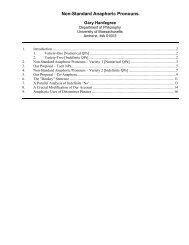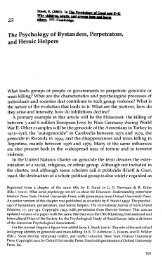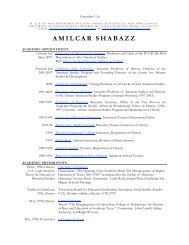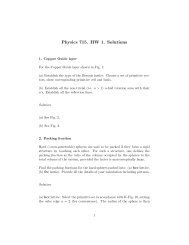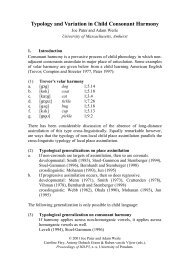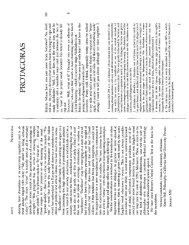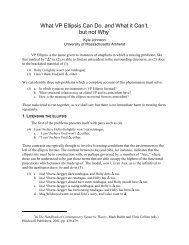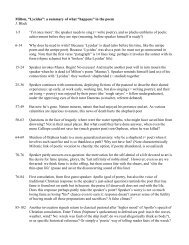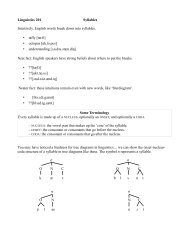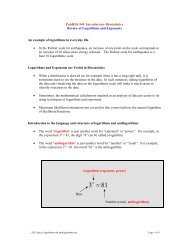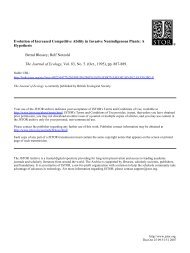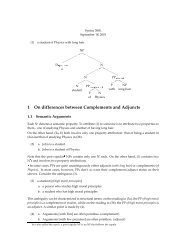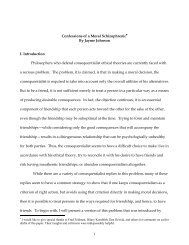Aristotle's Definitions of the Soul: "De Anima" ii, 1-3
Aristotle's Definitions of the Soul: "De Anima" ii, 1-3
Aristotle's Definitions of the Soul: "De Anima" ii, 1-3
Create successful ePaper yourself
Turn your PDF publications into a flip-book with our unique Google optimized e-Paper software.
obtains between soul and body (1045 a 23-33 with 1075 b 34-37). But<br />
Aristotle is not claiming <strong>the</strong>re that every form is identical with some<br />
proximate matter. He denies that in <strong>the</strong> very place where he speaks <strong>of</strong> <strong>the</strong><br />
form and <strong>the</strong> matter as one (1045 a 36, f.).41 It is "<strong>the</strong> proximate matter<br />
and its form" which are one (cf. 1041 b 7-9). So when Aristotle speaks in<br />
just <strong>the</strong> same way about soul and body he need only be talking about<br />
embodied souls and ensouled bodies. In <strong>the</strong> subsequent discussion <strong>the</strong><br />
terms "soul" and "body" are used in a similarly restricted way to refer only<br />
to animal soul and body (412 b 27 - 413 a 3 with 412 b 22-25).<br />
Aristotle also remarks, at 414 a 19, ff. that:<br />
Those who take it that <strong>the</strong> soul is nei<strong>the</strong>r independent <strong>of</strong> body nor a type <strong>of</strong> body are<br />
right. It is not a body but a type <strong>of</strong> thing which belongs to a body and, <strong>the</strong>refore, it<br />
exists (in&pXEL) in a body - a body <strong>of</strong> a particular sort.<br />
This too might be taken to go against <strong>the</strong> interpretation proposed here. But<br />
Aristotle is again not taLking about all cases <strong>of</strong> soul. He is using <strong>the</strong> term<br />
"<strong>the</strong> soul" here in <strong>the</strong> familiar sense <strong>of</strong> "<strong>the</strong> human soul," as <strong>the</strong> context<br />
makes clear. The "soul" which Aristotle has just been discussing is "that<br />
whereby we live and perceive and have understanding primarily" (414<br />
a12-13). This is only one in <strong>the</strong> series <strong>of</strong> types <strong>of</strong> soul which Aristotle is<br />
surveying in <strong>De</strong> A nima 11, 2- <strong>the</strong> human soul. Aristotle wants to show that<br />
this soul is, like <strong>the</strong> o<strong>the</strong>rs surveyed <strong>the</strong>re, "a type <strong>of</strong> thing which belongs to<br />
a body."42<br />
Finally, <strong>the</strong>re is <strong>Aristotle's</strong> suggestion that <strong>the</strong> intellect and <strong>the</strong> faculty<br />
<strong>of</strong> <strong>the</strong>oretical reasoning, being separable from <strong>the</strong> body, constitute "a<br />
distinct kind <strong>of</strong> soul" (4vxijs y?VOS '?'TEpov, 413 b 26). Some have read this<br />
remark to mean that <strong>the</strong> study <strong>of</strong> this faculty <strong>of</strong> soul belongs to a different<br />
science altoge<strong>the</strong>r than <strong>the</strong> one whose subject is delimited by <strong>the</strong> general<br />
definition <strong>of</strong> soul in II, 1.43 If that were so <strong>the</strong>n we would not have to worry<br />
over how to make <strong>the</strong> definition <strong>of</strong> II, 1 fit <strong>the</strong> separate intellect. However,<br />
Aristotle treats this faculty <strong>of</strong> soul as one <strong>of</strong> <strong>the</strong> parts <strong>of</strong> <strong>the</strong> generic entity he<br />
is discussing in <strong>the</strong> very place where he refers to it as a distinct kind <strong>of</strong> soul.<br />
(See r6t XoLrr &0pupa iris 4vxips, 413 b 27-28). He treats it in <strong>the</strong> same way in<br />
<strong>De</strong>Anima III, 4 (429 a 10, f.; cf. a 23) and speaks <strong>of</strong> it <strong>the</strong>re as a type <strong>of</strong> soul<br />
(i voqrIxi [+vx ], a 28; cf. <strong>De</strong> GenerationeAnimalium 736 b 13-16). If this is<br />
so <strong>the</strong>n <strong>the</strong> definition <strong>of</strong> II, 1 which mentions something common to every<br />
soul must cover it. And <strong>the</strong> only way allowed by Aristotle to read a<br />
definition which makes it intelligible how <strong>the</strong> account <strong>of</strong> II, 1 can mention<br />
something which belongs to <strong>the</strong> separate intellect is <strong>the</strong> way defended<br />
above.<br />
10. It remains for us to deal with a ra<strong>the</strong>r technical problem concerning<br />
271



